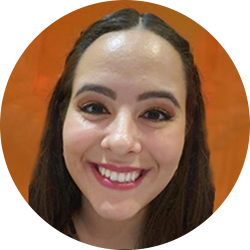Program Overview
Applicants with a Valid Indiana Teaching License
The ELL Graduate Licensure Program uses an online delivery format of five courses. Each course that is offered during the academic year is 8 weeks long; this means that two courses are offered consecutively each semester. Additionally, one course is offered during the summer. Each course requires students to complete field experiences in a K-12 classroom that enrolls English Language Learners. Course substitutions are not permitted.
There is a three-year time limit for completion of the ELL Graduate Licensure Program. This three-year time limit begins with the semester when the first required course is taken. Program completion includes: (a) completion of all course work with a passing grade, (b) completion fulfillment of the e-portfolio requirement for the program, and (c) completion of the state’s content specialty test. A student who receives a grade of “D” or “F” in a licensure course may retake the course one time only; this does not change the 3-year time limit for completion of all licensure requirements. The P/NP option is not available.
The ELL license issued through Purdue University constitutes an addition to an existing instructional license; not a stand-alone teaching license. In order to be eligible for ELL licensure through Purdue University, applicants must possess a valid instructional license issued by the State of Indiana. Non-Indiana applicants are not guaranteed licensure in Indiana or any other state. State licensing rules and standards are always subject to change and as such, Purdue University is unable to safeguard that the ELL program will satisfy non-Indiana teacher licensing standards and rules.
To be as proactive as possible, all ELL licensure-seeking students require a transcript evaluation and credential review from the Office of Teacher Education and Licensure to verify possession of an official instructional license. Upon review, any applicant who does not hold a valid Indiana elementary, exceptional needs, or secondary instructional license will be required to submit written confirmation, on letterhead, from their state education agency verifying that completion of Purdue’s ELL Graduate Licensure Program will satisfy the student’s individual non-Indiana license configuration within the three-year timeline of the program.
This verification must be received by the end of the semester during which the student’s course work for the ELL Graduate Licensure Program is completed. If confirmation is not received, Purdue University will be unable to verify completion of the program for licensing purposes to any state-based educational agency, school district, or hiring agent. In the absence of a license, the student’s participation in the ELL program is solely defined as professional development and will not constitute teacher licensure.
Career Outlook
ESL educators are some of the most in demand teachers. The demand for ESL teachers will only increase as more students from non-English-speaking homes enter school.
The Purdue ELL Program strives to create a learning environment that is academically challenging for students at all levels. Because of the special needs of their students, ELL teachers may meet more frequently with parents and administrative teams to measure student progress and achievement as part of each student’s individual education plan.
Job Titles
- ELL Specialist
- Director of ELL
- Teacher
- Tutor
- Adult Education Teacher
- Curriculum Coordinator
Courses
Students spend an average of 15 hours a week on homework.
The program uses an online delivery format of five courses. Each course is 8 weeks long; this means that two courses are offered consecutively each semester The last course is a 4 week practicum during the summer session. Each course also requires students to complete field experiences in a K-12 classroom that enrolls English Language Learners.
15 Credit Hours of Coursework
EDCI 55900 – Academic Language and Content Area Learning
(Spring course, 1st 8 weeks)
This course focuses on the linguistic challenges faced by English language learners in the content areas of science, language arts, mathematics, and the social studies. The course links these challenges to English language instruction and subject-matter instruction in English for ELLs who are in mainstream classrooms. The course emphasizes assessment tools designed to assess content knowledge and links these to issues of language development. This course requires field experiences in schools.
EDCI 51900 – Teaching English Language Learners
(Spring course, 2nd 8 weeks)
This course addresses second language instruction and subject-matter instruction in English for ELL students who are in mainstream classrooms. The purpose of this course is to provide students with information necessary to the design of materials and instructional strategies for English language learners P-12. The course considers the nature of immigrants’ experiences of a new country and school context, focuses on the current issues and techniques in instruction for students who are at the beginning or intermediate stages of English language acquisition in the school context. This course requires field experiences in schools.
EDCI 55700 – Assessment of Culturally and Linguistically Diverse Students
(Summer course, 4 weeks)
This 4-week online summer course will provide a critical review of research and practice in language proficiency and content-area assessment of English Language Learners (ELLs) and other culturally and linguistically diverse (CLD) students in K-12 education. We will explore the sociocultural dimensions of standardized testing, academic achievement, and accountability. Students will conduct critical analyses of standardized testing instruments and learn to develop alternative classroom-based language, literacy, and content-area assessments appropriate for ELL and CLD students.
EDCI 53000 – English Language Development
(Fall course, 1st 8 weeks)
This course focuses on knowledge about how second languages are learned and on the educational basis for second language teaching and learning. The course links English language development to teaching and learning strategies. In addition to a case study and final report, students will collaborate in small groups to create online multimedia poster presentations that summarize key points and issues. This course requires field experiences in schools.
EDCI 52600 – Language Study for Educators
(Fall course, 2nd 8 weeks)
Students will gain information about central concepts from descriptive and applied linguistics, applying these to analyze language and interaction between teachers and ELs for effective teaching. The major assignments for the course are two classroom observations and the planning, teaching, and evaluation of two lessons conducted with small groups of ELs. This course requires field experiences in schools.
Participation in a Professional Conference
In addition to successful completion of the above courses, candidates are also required to attend and to participate in a state, national, or international conference on English Language Learning (e.g., TESOL, NABE, AAAL, INTESOL, IN K-12 ESL) during enrollment in the program. Candidates will write a reflection on their participation. Participation includes (a) giving a professional presentation (paper presentation, colloquium, poster, demonstration, or round table discussion); and (b) volunteering to work on a conference committee or to moderate or chair a session.
Content Specialty Exam
Beginning September 1, 2021, all licensure students are required to pass the Praxis exam (5362) English to Speakers of Other Languages prior to adding this content area to their Indiana instructional license. Information about this test can be obtained at Indiana Required Test (ets.org).
Online Portfolio
At the end of the licensure program, candidates will complete an online portfolio. Portfolio sections correspond to Purdue’s ELL Licensure Program Teacher Outcomes and Standards. Products to be included in each section will be developed throughout the program, in each course. Candidates will also include their reflection on participation in a professional conference as part of the portfolio. Portfolio components will be assessed by means of rubrics that correlate with the TESOL/CAEP Standards. Portfolio components will be compiled in alignment with each course completed for the program, also correlated with the TESOL/CAEP Standards.
Program Completion
To complete the ELL Licensure Program and obtain your ELL license, make sure that you have:
- Completed all 5 courses
- Uploaded 7 key assessments at the end of each course to Watermark (hosted within your Brightspace section).
- EDCI 530: Key assessment 7 (ELL Case study)
- EDCI 526: Key assessment 3 & 8 (Visual and Verbal Analysis; ESL
Conference reflection)
- EDCI 559: Key assessment 4 and 6 (Instruction-Assessment Project;
Multiliteracies Project)
- EDCI 519: Key assessment 5: Materials Design Project
- EDCI 557: Key assessment 2: Teacher made assessment
- Passed the Praxis exam (5362) English to Speakers of Other Languages
This program leads to an addition to an existing Indiana Instructional license. Applicants must possess a valid Indiana Instructional license for program admission. Non-Indiana applicants are not guaranteed licensure in Indiana or any other state. Contact the College of Education Office of Teacher Education and Licensure (OTEL) at licensure@purdue.edu before continuing with the program application if you have questions about licensure.
Please visit the Graduate Licensure Program page for information about license eligibility requirements.
Cost
The English Language Learners Licensure Program is affordable and competitive in cost.
|
In-State |
Out-of-State |
| Total Cost Per Credit |
$580 |
$600 |
| Credit Hours |
15 |
15 |
| Total Costs |
$8,700 |
$9,000 |
*Tuition and fees are charges on a per credit hour basis and are subject to annual increase. Annual increases may change the total program costs.
*Note: Purdue faculty and staff fee remissions may not be applied to this program.
*Books are included in the costs of the program.
*International fee may be applicable
**The cost of attending Purdue varies depending on where you choose to live, enrollment in a specific program or college, food and travel expenses, and other variables. The Office of the Bursar website shows estimated costs for the current aid year for students by semester and academic year. These amounts are used in determining a student’s estimated eligibility for financial aid. You can also use our tuition calculator to estimate tuition costs.
Admissions
The program admits new students in fall only. Incomplete applications will not be reviewed by faculty.
Application Deadline: March 15
Transcript Evaluation and Credential Review (TECR) Request Deadline: March 1
For more information, view the Application Roadmap.
Application Checklist
During the process, be sure to reach out to the admissions counselor to help you through the process. The following checklist will assist you in completing your Graduate School application.
- Request a Transcript Evaluation and Credential Review (TECR) (Click here)
- Cost $35
- Must have an initial instructional teacher license
- Follow up in 4 weeks if you have not received your evaluation Office of Teacher Education and Licensure
- Create an application account to start your Graduate School application.
- Login to the Graduate School application using your account credentials.
- Complete the following sections of the application based upon your enrollment objective: Degree Seeking (Teacher Licensure – English Language Learning) –
- Applicant Information – Personal Background, Emergency Contact, Residency
- Campus and Program
- Campus: Select “West Lafayette”
- Proposed Graduate Major: Select “Curriculum and Instruction”
- Area of Interest: Select “English Language Learning”
- Degree Objective: Select “Teacher Licensure (TL-EDCI)”
- Course Delivery: Select “Distance (online or off-campus location)”
- Education Background
- Supplemental Form (not required)
- Employment & Other History
- Resume Upload (not required)
- Personal History Statement (required)
- Academic Statement of Purpose (required)
- Fellowship Applicant Essay Upload (not required)
- Recommendations (not required)
- Acknowledgments
- Faculty Selections (not required)
- No fee is required for teacher licensure – be sure the fee is waived.
- Contact the admissions representative at edgrad@purdue.edu if you need assistance.
- The Personal History Statement (required) helps reviewers learn more about you as a whole person and as a potential graduate student. This may include relevant details on community service, leadership roles, participation in diverse teams, and significant barriers that you overcame to attend graduate school.
- The Academic Statement of Purpose (required) is an opportunity for you to share information that will help reviewers understand your academic interests and objectives, assess your academic background, preparation, and training, and determine if you are a good match for the program to which you are applying.
- Submit an official transcript for every college or university attended. Official transcripts should be requested to be sent directly from the issuing institution to the Purdue Graduate School or gradadm@purdue.edu. If possible, please select Attn: “Grad School.”
- Social Security numbers must be marked out before any document is uploaded.
- If degree/date awarded not listed on transcript, a copy of the original diploma must be made and verified by one of the following: the institution that issued the diploma, the employer, an official such as a lawyer (notarized), or an upper-level financial institution employee (notarized). The verifier must write “This is a true original copy of the diploma for (applicant’s full name)” on the copy, and include their name, title, phone, and email address on the copy. The copy cannot be faxed or sent over email; it must be mailed to the graduate program.
- International degree-seeking applicants whose native language is not English are required to submit proof of English proficiency. The Graduate School accepts the Test of English as a Foreign Language (TOEFL) or International English Language Testing System (IELTS) scores for admission. View the Graduate School’s minimum score requirements.
- The Graduate School will routinely waive the English proficiency requirement for applicants who have received a degree within the last 3 years from a school where English is the primary language of instruction in one of the recognized English-speaking countries. Note: If you have not done so already, request that ETS send your scores electronically to the Purdue University West Lafayette campus using code 1631.
- You may check the status of your submitted application by logging into your online application. We will keep you updated as any items arrive.
This program is subject to our Licensure Disclosure
The U.S. Department of Education requires institutions to publicly disclose to prospective and currently enrolled students whether certain programs meet the education requirements for licensure or certification in the state or territory in which they reside. “Programs Leading to Professional Licensure” is defined as programs represented to prepare students for an occupation for which, at completion of the program, a local, state or federal license, or nongovernmental certification is required (i) as a precondition for employment, (ii) to perform certain functions, or (iii) to meet additional conditions that are generally needed to secure employment.
The Purdue University Teacher Education Program is nationally accredited by the Council for the Accreditation of Educator Preparation (CAEP) and the State of Indiana. However, not all undergraduate and graduate programs lead to an educator licensure in the State of Indiana. If your Teacher Education program includes field experience(s) and a student teaching or internship component, it may lead to an educator license in the State of Indiana, if you meet the licensure requirements. Contact your academic/faculty advisor and/or the Office of Teacher and Licensure at licensure@purdue.edu to verify your program enrollment and whether or not it leads to a license in the State of Indiana.
The State of Indiana has reciprocity agreements with other states, the District of Columbia, and territories. For licensing information contact information for individual state departments of education or visit the National Association of State Directors of Teacher Education and Certification (NASDTEC) or email a Purdue University licensing officer/advisor at licensure@purdue.edu.
Program Faculty
Our faculty are nationally recognized and have the ability to work personally with students to individualize their plan of study to meet personal career interests and goals. These faculty will oversee the intensive coursework required.
Testimonials
Purdue’s ELL program changed my life! I am now an ELL Specialist in my school’s district. The courses provided me with great knowledge and helped me expand my boundaries of learning. I would go again in a heartbeat! In fact, this summer I plan on rereading some of my textbooks for a refresher for next school year.
GUADALUPE ALVARADO
Lake Central School Corporation
I literally turned in my final project, interviewed for a position in my field within my corporation and was hired two days later. I felt extremely prepared for my new role because of the skills learned. I look forward to applying this knowledge along with my background in elementary education in my new role.
ANDREA BOYLE
Franklin Township Community School Corporation
Earning my Teachers of English Learners certification was the most challenging academic coursework I have ever completed. I now have a wealth of knowledge and resources to help all learners achieve success.
CLAIRE GROSTEFON
Logansport Community School Corporation
So happy to be a boiler twice over. Both my undergrad and graduate experiences at Purdue were fruitful and educational, preparing me for the world around me. I especially love the focus that Purdue education has with equality and civil issues. It really helped educate me on how to adjust to students’ needs these days. LOVED IT.
LAYNE ELISE KIRCHOFF
Batesville Community School Corporation
Frequently Asked Questions
- Can I get both the graduate certificate and Indiana Licensure?
No, Students should select one path that best fits their goals.
- How many credit hours to receive the graduate certificate?
15 credit hours
- How long are the courses?
8 weeks
- How much time should I allow for doing homework and completing assignments?
Plan on devoting 10–15 hours a week on coursework, depending on the course requirements that week and your study habits.
- Do I need a teaching license to take the program?
Participants must have a teaching license to participate in the ELL Licensure Program. This is an add on license. If you do not have an instructional license the Teaching English Language Learning Graduate Certificate is the best path for you.



